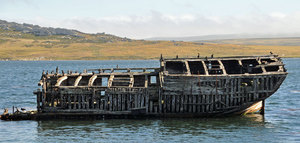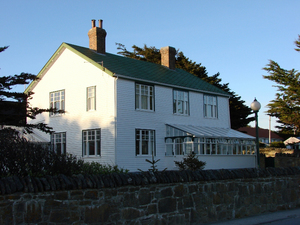PACKE, ROBERT CHRISTOPHER
c 1824 - 1894 from England
landowner, was probably born in 1824. He was one of the sons of Colonel Henry Packe of Twyford Hall, Twyford near Reepham, Norfolk. His father was the principal landowner in this small parish which in 1841 consisted of 529 acres and 94 souls. Twyford Hall was described in 1845 as 'a neat mansion in pleasant grounds'. Nothing is known of Packe's schooling. His father bought him a commission in the 34th Regiment of Foot and he was commissioned as an ensign on 1 June 1841. He was promoted to lieutenant on 13 December 1843 and later rose to the rank of captain. He retained this title after leaving the Army in 1851.
His resignation was to enable him to start a new business career in the Falklands. He had become interested in the Falklands in 1848 when his cousin Philip Hamond told him about his experiences sailing round the islands with Captain BJ SULIVAN. Packe's conviction that the Falklands offered him an opportunity for a new career was reinforced by a long article about the Islands in Cockburn's New Monthly Magazine for November 1849.
The Falklands shipping register recorded the arrival of the 450 ton barque Lalla Rookh on 11 May 1851: ' With Capt. Packe and stores for Capt. Sulivan, 89 days out' from London. His own supplies followed him out in the barque Augusta which arrived on 19 August of the same year. On arrival Packe immediately sought to acquire land from the government initially with leases on East Falkland - Fitzroy and Port Louis. He and his brother Edward who arrived in 1866 ultimately extended their holdings to 105,000 acres. They also created a substantial holding on West Falkland in three separate sites at Port Howard, Fox Bay East and Dunnose Head, totalling 118,000 acres. Robert Packe's principal contribution to the economy of the Islands was the introduction of large-scale sheep farming. By 1861, he was asking for government assistance under the Colonial Land and Emigration Commissioner's Land order system to import two shepherds and their families from the United Kingdom. By the 1870s sheep had been become the major agricultural activity in the islands.
Packe was also involved in cattle farming and in the capture and slaughter of wild cattle. The latter also provided a ready income from the sale of their hides and their meat. Fresh beef was always in demand from ships calling at Stanley. The ownership of the wild cattle had been a vexed question between successive Governors and their lessees. In 1860, the Privy Council ruled they were ferae naturae and that the lessees had the right to dispose of the cattle without having to seek permission or pay a royalty to the Governor. Packe among others was entitled to compensation for the fines and royalties he had paid since the Governor had resumed authority over these cattle. In 1861, he claimed £637 for the 23 cattle he had killed plus those killed by one of the PITALUGA family on his leaseholds. He also submitted a claim for a further £1200 for 'having suffered great loss from having his tame herds and flocks decoyed away into the mountains, and likewise been deprived of the value of hides of many hundreds of these animals which he certainly should have destroyed'. There were other clashes with various Governors on land-holding matters and also with the Falkland Islands Company. In 1862, for example, Packe took two Falkland Island Company employees to court for damage to his land by the company practice of firing their own grasslands which bounded Packe's holdings.
Packe lived at Sulivan House, Stanley. In 1872 he bought the barque Jhelum as a storage depot and workshop, had her beached outside his house at the upper end of the harbour. This vessel had entered Stanley in distress in 1869 and was finally condemned as unseaworthy in 1871. He also ran a cutter to deliver supplies and collect fleeces and hides from his outlying holdings. In June 1871 he offered to sell his 16 ton cutter Exe (built in 1868 at Exmouth) to the Falkland Islands Government as pilot boat for Stanley Harbour for £300.
Packe was also part of the tiny group of 'socially elite' in Falklands Society. As such, he played a part in the government of the Islands and was a member of the LegCo and a magistrate. On the occasion of the first visit of a member of the Royal Family in 1871, he organised a shooting expedition for ALFRED, Duke of Edinburgh, one of Queen Victoria's sons and commander of HMS Galatea, to Mare Harbour and shot guanaco, geese, duck and snipe. He was set to arrange a similar trip for the two royal princes, ALBERT VICTOR and GEORGE when they visited in January 1881 - 'Captain Packe, a Norfolk gentleman whom we have met out hunting at Sandringham, and who is one of the proprietors here...' (Cruise of HMS Bacchante), but the visitors had to sail earlier than expected.
In 1880, as the senior Justice of the Peace he stood in for the governor after Governor CALLAGHAN left on 17 January until the arrival of Governor KERR on 24 November. He seems to have retired from the Islands sometime in the late 1880s and died at Upper Norwood, London on 5 November 1893 aged 69 years. He is remembered by the settlement named Packe's Port Howard, on West Falkland.
Comments
Revisions
May 2019 Photograph added
June 2019 Photograph added

